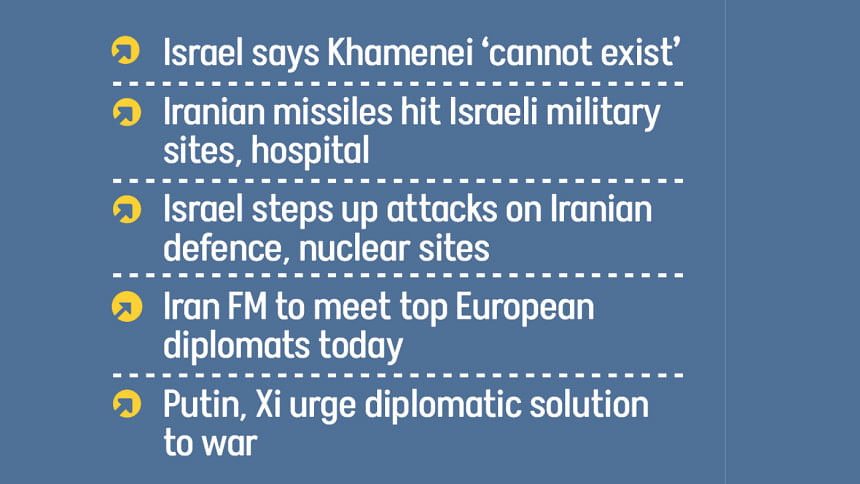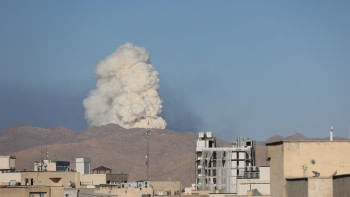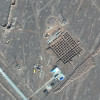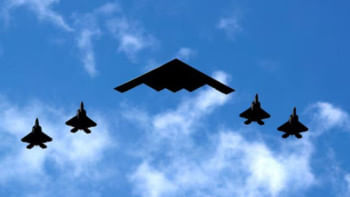‘Two weeks for diplomacy’

US President Donald Trump yesterday said he will decide whether to attack Iran within the next two weeks due to a "substantial" chance of negotiations, as Israel and its regional rival traded fire for a seventh day.
White House Press Secretary Karoline Leavitt read out a message from Trump at a briefing, saying there had been "a lot of speculation" about whether the United States would be "directly involved."

"Based on the fact that there's a substantial chance of negotiations that may or may not take place with Iran in the near future, I will make my decision whether or not to go within the next two weeks," Leavitt quoted Trump as saying.
Leavitt declined to say if Trump would seek congressional authorisation for any strikes on Iran.
The statement came as the week-old air war escalated with no sign yet of an off-ramp.
The statement from the White House came as Iran's Foreign Minister Abbas Araghchi said he is set to meet with top diplomats of Britain, France, Germany and the European Union today in Geneva.
He said the meeting had come at the request of the three European states.
On the ground, Israel yesterday bombed nuclear targets in Iran, and Iran fired missiles and drones at Israel. Israel said a strike on an Israeli hospital overnight injured at least 40 people.
Following the strike that damaged the Soroka medical centre in Israel's southern city of Beersheba, Prime Minister Benjamin Netanyahu said Tehran's "tyrants" would pay the "full price".
Defence Minister Israel Katz said the military had been instructed to intensify strikes on strategic targets in Tehran in order to eliminate the threat to Israel and destabilise the "Ayatollah regime".
Katz also warned that Iran's supreme leader "can no longer be allowed to exist".
Iran said the attack was targeted at Israeli military and intelligence headquarters near the hospital. An Israeli military official denied there were military targets nearby.
The escalation and threats came as global powers urged the warring parties to find a diplomatic solution.
China's President Xi Jinping yesterday held a phone call with Russia's Vladimir Putin, and after that, urged a ceasefire between Iran and Israel.
"Parties to the conflict, especially Israel, should cease hostilities as soon as possible to prevent a cyclical escalation and resolutely avoid the spillover of the war," Xi said, according to Xinhua.
Earlier, Moscow reiterated its call for peace and warned the US not to take military action against Iran.
Moscow is one of Iran's most important allies, with the two deepening military cooperation and inking a strategic partnership agreement just months ago.
According to Israeli, Western and regional officials, Israel's sweeping campaign of airstrikes aims to do more than destroy Iran's nuclear centrifuges and missile capabilities. It seeks to shatter the foundations of Khamenei's government and leave it near collapse.
Netanyahu wants Iran weakened enough to be forced into fundamental concessions on permanently abandoning its nuclear enrichment, its ballistic missile programme and its support for militant groups across the region, the sources said.
The diplomatic efforts continued as Israel said it struck Iran's Natanz and Isfahan nuclear sites yesterday. It initially said it had also hit Bushehr, site of Iran's only functioning nuclear power plant, but a spokesperson later said it was a mistake to have said this.
It also said it targeted the Khondab nuclear site near Iran's central city Arak overnight, including a partially-built heavy-water research reactor. Iran's atomic energy agency said the attack caused no casualties.
Israel's military also claimed that it has struck "hundreds" of surface-to-surface missile launchers and two-thirds of the country's missile silos.
Trump has veered from proposing a swift diplomatic end to the war to suggesting the United States might join it. On Wednesday, he said nobody knew what he would do. A day earlier, he mused on social media about killing Khamenei, then demanded Iran's unconditional surrender.
Khamenei has rejected Trump's demand for an "unconditional surrender".
Yesterday, the Iranian supreme leader said the Israeli regime was showing signs of weakness.
"The very fact that the Zionist regime's American friends have entered the scene and are saying such things is a sign of that regime's weakness and inability", Iran's supreme leader posted on X.
Earlier, Netanyahu said that the United States is "already helping a lot" in his country's conflict with Iran.
"They're participating in the protection of the skies over Israel and its cities," Netanyahu told CNN. "I think it's a remarkable cooperation."
The prime minister also said that he is being asked whether Israel is targeting the downfall of the Iranian regime. "That may be the result," he said. "But it's up to the Iranian people to rise for their freedom. Freedom is never cheap."
"We may create conditions that may help them do it," Netanyahu said.
Any US involvement would be expected to involve the bombing of a crucial underground Iranian nuclear facility in Fordo, using specially developed bunker-busting bombs.
The Wall Street Journal reported that Trump had told aides on Tuesday he had approved attack plans but was holding off to see if Iran would give up its nuclear programme.
A week of Israeli air and missile strikes against its major rival has wiped out the top echelon of Iran's military command, damaged its nuclear capabilities and killed hundreds of people, while Iranian retaliatory strikes have killed at least two dozen civilians in Israel.
Iran has been weighing its options in responding to its biggest security challenge since the 1979 revolution. A member of the Iranian Parliament's National Security Committee Presidium, Behnam Saeedi, told the semi-official Mehr news agency Iran could consider closing the Strait of Hormuz, through which 20 percent of daily global oil consumption passes.
Amid the raging conflict, countries around the world are taking measures to evacuate their citizens from Israel and Iran. The airspace in the region remains closed.
Israel, which has the most advanced military in the Middle East, has been fighting on several fronts since October 7, 2023, when it its Gaza offensive. Since then it has severely weakened Iran's regional allies, Hamas in Gaza and Lebanon's Hezbollah, and bombed Yemen's Houthis.
The extent of the damage inside Iran from the week-old bombing campaign has become more difficult to assess in recent days, with the authorities apparently seeking to prevent panic by limiting information.
Iran has stopped giving updates on the death toll, and state media have ceased showing widespread images of destruction. The internet has been almost completely shut down, and the public has been banned from filming.
Israel has issued evacuation orders for whole sections of Tehran, a city of 10 million. Thousands of residents have fled, said reports.
Inside Israel, the missile strikes over the past week are the first time a significant number of projectiles from Iran have pierced defences and killed Israelis in their homes.
According to Israeli newspaper Yedioth Ahronoth, thousands of people in Israel have become homeless as a result of Iran's retaliatory missile attacks.
The Israeli Ministry of Interior classified 5,110 people as homeless, including 907 from Tel Aviv, the report said.

 For all latest news, follow The Daily Star's Google News channel.
For all latest news, follow The Daily Star's Google News channel. 











Comments